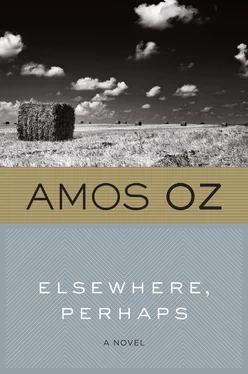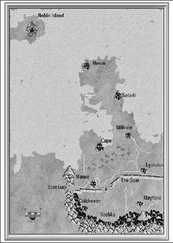Amos Oz - Elsewhere, Perhaps
Здесь есть возможность читать онлайн «Amos Oz - Elsewhere, Perhaps» весь текст электронной книги совершенно бесплатно (целиком полную версию без сокращений). В некоторых случаях можно слушать аудио, скачать через торрент в формате fb2 и присутствует краткое содержание. Год выпуска: 1985, Издательство: Mariner Books, Жанр: Современная проза, на английском языке. Описание произведения, (предисловие) а так же отзывы посетителей доступны на портале библиотеки ЛибКат.
- Название:Elsewhere, Perhaps
- Автор:
- Издательство:Mariner Books
- Жанр:
- Год:1985
- ISBN:нет данных
- Рейтинг книги:4 / 5. Голосов: 1
-
Избранное:Добавить в избранное
- Отзывы:
-
Ваша оценка:
- 80
- 1
- 2
- 3
- 4
- 5
Elsewhere, Perhaps: краткое содержание, описание и аннотация
Предлагаем к чтению аннотацию, описание, краткое содержание или предисловие (зависит от того, что написал сам автор книги «Elsewhere, Perhaps»). Если вы не нашли необходимую информацию о книге — напишите в комментариях, мы постараемся отыскать её.
Elsewhere, Perhaps — читать онлайн бесплатно полную книгу (весь текст) целиком
Ниже представлен текст книги, разбитый по страницам. Система сохранения места последней прочитанной страницы, позволяет с удобством читать онлайн бесплатно книгу «Elsewhere, Perhaps», без необходимости каждый раз заново искать на чём Вы остановились. Поставьте закладку, и сможете в любой момент перейти на страницу, на которой закончили чтение.
Интервал:
Закладка:
Those who passed by pretended not to see them, either because their power of judging had reached saturation point or because the community, at the end of a subtle and complicated process, had formed its final conclusions. About Reuven Harish they said:
"He's withdrawn completely into himself."
"She never goes to see him."
"He's not the type to collapse at a single blow. But he's yielding, he's bending. It's horrible."
About Ezra Berger:
"Gradually he'll go back to Bronka. They'll meet each other halfway. There'll be a period of melancholy, but he'll go back. It's bound to happen."
"Time. That's all. Time heals all wounds. Winter will come. He won't go on driving day and night. There won't be anywhere for him to go day and night. The nights will get longer. And he'll go back to Bronka. Last Saturday he played on the lawn with the grandchild. Twice he laughed aloud. And that evening he was seen on Grisha's veranda, playing chess with Grisha. Time doesn't stand still. He's only got to get rid of his guest. He has a bad influence on him."
The man stared fixedly at the cigarette he was holding. The girl was sitting curled up at the far end of the bench. Her little belly made whoever looked at her realize how slender, how long her legs were. (But nobody looked at her for long. They looked away quickly as if burned.)
The leaves rustled on the trees. Starlings performed a hysterical dance in the air. They settled on the electric wires, then flapped gently toward the water tower, but changed their minds halfway and with a sudden unanimous decision headed instead for the tin roof of the cattle sheds.
Zechariah went on smoking.
A small branch from one of the bushes nudged Noga's shoulder. She played with it. She pushed it away and, like a spring, it came back and poked her again on the shoulder.
Zechariah observed her game. He chuckled.
Noga said:
"That's not a smile; it's a grimace. You can't smile."
Zechariah told her about an ill-fated woman who had said something similar to him many years before.
Noga asked what had happened to the woman.
"She must be dead by now. What of it?"
Noga said she was sure he must have seen a lot in the course of his life.
Zechariah started to describe Eva Hamburger's present life Noga did not press him for details, nor did she interrupt him. He stopped talking. Stabbed out his cigarette. Lit another.
"I shan't press you to speak," he said. "I know who you are. You're one of us."
"It's getting dark," Noga said. "Let's go and have supper. If we're late…" She did not complete the sentence. Apparently she was not concentrating.
Zechariah stood up and offered the girl his arm. Noga did not take the hint; she refused to be supported. She walked beside the man, not touching him even lightly
After supper Noga went to her room. She got into bed. Nowadays she spent twelve or fourteen hours every day asleep. A great tiredness came over her all the time.
Zechariah sat in his brother's house. Bronka would not hint that he should leave, even though she wanted him to. She served him one cold drink after another, because he was not used to the climate. His throat was always parched. Over and over again, Bronka told him to feel at home and help himself to a drink whenever he felt like it. Zechariah claimed that it tasted better when it was poured out for him by Bronka. Sometimes he told her strange stories. She listened to them because he was her guest and her husband's brother, but she did not answer him much because she did not like the man.
He told her, for instance, about the early days in Germany. It had been in 1950, or at the end of 1949. He had come to squeeze some reparation money out of them, and while his claims were under examination he was penniless. So he had to find work, any work. Those were difficult days. Everything was still in ruins. He found a rather strange job, but one couldn't afford to be choosy in those days. He was taken on as a temporary worker in the municipal health department in Hamburg. He worked at night, in a team of displaced refugees. Their job was to round up stray dogs. They were paid according to the number of dogs they caught, and at that time there was an ever-increasing multitude of strays. Some of them still showed signs of a pedigree, but the purity of their line had become contaminated during the war years. We used to fool the authorities. We would catch the dogs, present them to the official in charge, get an officially stamped receipt for each dog, all in accordance with the strictest German efficiency, and then we would take them to the municipal rubbish dump to poison them. And, thereby, as you will have guessed by now, my dear Bronka, hangs the tale. We didn't kill the dogs. We used to let them go. Within an hour or two they had reappeared in the suburbs. We dutifully rounded them up again the next night and once again received good German money for each and every dog. There were some dogs we captured and released twenty or thirty times. The authorities were alarmed at their extraordinary proliferation. The more they harassed them, the more they multiplied. As for us, we made friends with our mangy four-legged breadwinners and even gave them names — Heinz, Fritz, Franz, and Hermann. They used to give themselves up of their own free will, because they were fond of the journey to the municipal rubbish dump. Sometimes they found good food there. A stray dog's life is not a happy one, both from an economical and, more especially, from a psychological point of view. A dog needs to be loved. He needs a name. Needs to be recognized. We used to stroke them and tickle them behind the ears and call each one by its name and nickname, Fredi, Hansi, Rudi-Rudolfi-Rudolfini. After all, they were strays. A dog will sacrifice himself for a single sign of affection. A dog needs to belong. I'm sure you realize, Bronka, my love, that we didn't spare the lives of the mad dogs. We weren't criminals; we did have some sense of moral responsibility. Anyway, eventually, as you know, my claims received official approval, and then, beloved sister-in-law, then, new horizons opened up before me. But I fear I am not succeeding in entertaining you with my stories. Thomas Mann, in The Magic Mountain, describes a bore who is always badgering people with his trite moral tales. But his disease was tuberculosis. He was consumptive. You don't have to listen to me. I love you, my dear Bronka, even when you look at me with disgust or boredom on your face, because we both belong to the same family, and I love my family regardless of how they treat me. A man like me will go to the ends of the earth for a sign of affection. And a family is not a limited company. A family is a destiny. A man must always love his destiny, because he has no choice. Would you be kind enough to pour me another glass of orange juice? It's my throat. My throat's so dry. I don't stop talking. And I'm not used to the Asiatic climate. I am a — how shall I put it? — no, not a European, I'm a — let me put it this way — I'm a wintry type of person.
27. BELLS AND SADNESS
Reuven Harish was housebound. He had no teaching to do. It was the summer holidays. He should have been spending his time preparing his lessons for the coming school year. He tried to, but the words danced around on the page. He sits down at his desk and opens a book. The words do not form sentences. He opens another book. His head drops onto the desk. He gets up, washes his face with cold water, sips a cup of coffee, returns to the desk, and once more his hand pushes the book away, and his glance starts wandering. The coffee is supplied by the generous Nina Goldring. Nina has good-naturedly taken on herself the task of caring for Reuven Harish. Now that neither Bronka nor Noga sets foot inside his room, Nina gladly performs the errand of mercy. Reuven is not well. His shoulders seem to droop, his birdlike profile has become sharper than ever. Even his bright green eyes become blurred at times. He looks like someone who is exhausted from lack of sleep. This is far from being the case. Reuven is given to long, dreamless stretches of deep sleep. Just like his daughter. For no apparent reason his face is sometimes bathed in hot sweat, and giddiness lays him out on his bed. On bad days he is forbidden by the kibbutz doctor to make any effort. Seated in a deck chair on his veranda, he picks grapes from a large bunch until he suddenly dozes off in the heat of the morning sun and sleeps for several hours.
Читать дальшеИнтервал:
Закладка:
Похожие книги на «Elsewhere, Perhaps»
Представляем Вашему вниманию похожие книги на «Elsewhere, Perhaps» списком для выбора. Мы отобрали схожую по названию и смыслу литературу в надежде предоставить читателям больше вариантов отыскать новые, интересные, ещё непрочитанные произведения.
Обсуждение, отзывы о книге «Elsewhere, Perhaps» и просто собственные мнения читателей. Оставьте ваши комментарии, напишите, что Вы думаете о произведении, его смысле или главных героях. Укажите что конкретно понравилось, а что нет, и почему Вы так считаете.












